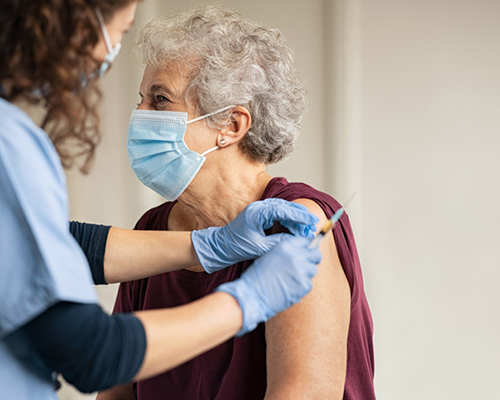
Researchers at the Bristol Trials Centre (CTEU) at the University of Bristol and University Hospitals Bristol and Weston NHS Foundation Trust (UHBW) are leading a new study which could set the foundations for how booster COVID-19 vaccinations are delivered in the future. The study, supported by the National Institute for Health Research (NIHR), will determine whether booster COVID-19 vaccines should be given at the same time as flu vaccines.
While there are vaccines that have been approved to protect against COVID-19 in the UK, it is not yet known whether further booster doses may be required to give continued protection, and how giving boosters might fit in with the seasonal flu jab programme.
From 29 March 2021, a study will look at the side effects and immune response given when people receive their COVID-19 booster and flu vaccine at the same appointment.
The study will involve people aged 18 years old or over who have received their first COVID-19 vaccination and are awaiting their second dose. It will look to recruit 504 participants across six NHS sites: Gloucestershire Hospitals NHS Foundation Trust, Great Western Hospitals NHS Foundation Trust, North Bristol NHS Trust, Royal Cornwall Hospitals NHS Trust, Royal United Hospitals Bath NHS Foundation Trust and UHBW.
Each participant will receive the second dose of the same COVID-19 vaccine they originally received, either the Pfizer/BioNTech COVID-19 vaccine or the Oxford/AstraZeneca COVID-19 vaccine.
Participants who are eligible to take part will then be allocated into one of two groups:
- One group will receive their second dose of the COVID-19 vaccine and the flu vaccine at their first visit, then a saline injection (placebo) at their second visit
- The other group will receive their second dose of the COVID-19 vaccine and a saline injection (placebo) at their first visit and then the flu vaccine at their second visit
Dr Rajeka Lazarus, a consultant in infectious diseases and microbiology at UHBW and Chief Investigator for the trial, said: "With the challenges of immunising large numbers of people against COVID-19 and the need to continue the seasonal influenza vaccination schedule, this next phase of vital research will establish whether it's possible for us to protect people from both of these viruses at the same appointment.
"This would mean fewer appointments for those who need both vaccines, reducing the burden on those who have underlying health conditions and would usually be offered the influenza vaccine.
"We particularly encourage people who would usually be offered the influenza vaccine, as well as individuals from across all communities, to volunteer to take part."
Chris Rogers, Professor of Medical Statistics and Clinical Trials and Director of Bristol Trials Centre, said: "We are delighted to be working with Dr Lazarus and UHBW to rapidly deliver this important research.
"The results will aid policy makers in planning the continuing vaccination programme."
Rebecca Maxwell, Clinical Lead for vaccinations at UHBW, said: "Receiving vaccinations is the most important thing we can do both to protect ourselves and reduce the spread of illness to vulnerable patient groups.
"This important piece of research will enable us to potentially protect more people in society against both flu and COVID-19 in a timely manner, both of which have significant effects on those most vulnerable in society.
"The success of both the flu campaign and the COVID-19 vaccine roll out this year has been impressive; this is the next step in helping us ensure protection for the public is achieved."
Dr Lazarus added: "Those taking part in this trial will play a crucial role in the global effort to continue to protect people from COVID-19, now and in the years to come."






